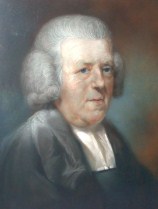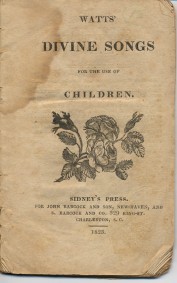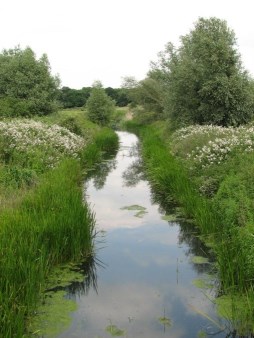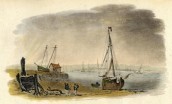My Profile (Newton tells his own story)
 "I was born in London the 24th of July, 1725, old style.1 My parents, though not wealthy, were respectable. My father was many years master of a ship in the Mediterranean trade. In the year 1748 he went Governor of York Fort in Hudson's Bay, where he died in the year 1750. "I was born in London the 24th of July, 1725, old style.1 My parents, though not wealthy, were respectable. My father was many years master of a ship in the Mediterranean trade. In the year 1748 he went Governor of York Fort in Hudson's Bay, where he died in the year 1750.
"My mother was a dissenter, a pious woman, and a member of the late Dr. Jennings's church. She was of a weak, consumptive habit, loved retirement, and, as I was her only child, she made it the chief business and pleasure of her life to instruct me, and bring me up in the nurture and admonition of the Lord. I have been told, that, from my birth, she had, in her mind, devoted me to the ministry; and that, had she lived till I was of a proper age, I was to have been sent to St Andrew's in Scotland to be educated. But the Lord had appointed otherwise. My mother died before I was seven years of age.

"I was rather of a sedentary turn, not active and playful, as boys commonly are, but seemed as willing to learn as my mother was to teach me. I had some capacity, and a retentive memory. When I was four years old, I could read, (hard names excepted,) as well as I can now: and could likewise repeat the answers to the questions in the Assembly's Shorter Catechism,2 with the proofs; and all Dr. Watt's smaller Catechisms,3 and his Children's Hymns.4
"When my father returned from sea, after my mother's death, he married again. My new mother was the daughter of a substantial grazier at Aveley in Essex. She seemed willing to adopt and bring me up; but, after two or three years, she had a son of her own, who engrossed the old man's notice. My father was a very sensible, and a moral man, as the world rates morality; but neither he, nor my step-mother, was under the impressions of religion: I was, therefore, much left to myself, to mingle with idle and wicked boys; and soon learnt their ways.
 "I was never at school but about two years; from my eighth to my tenth year. It was a boarding-school at Stratford, in Essex. Though my father left me much to run about the streets, yet, when under his eye, he kept me at a great distance. I am persuaded he loved me, but he seemed not willing that I should know it. I was with him in a state of fear and bondage. His sternness, together with the severity of my schoolmaster, broke and overawed my spirit, and almost made me a dolt; so that part of the two years I was at school, instead of making a progress, I nearly forgot all that my good mother had taught me. "I was never at school but about two years; from my eighth to my tenth year. It was a boarding-school at Stratford, in Essex. Though my father left me much to run about the streets, yet, when under his eye, he kept me at a great distance. I am persuaded he loved me, but he seemed not willing that I should know it. I was with him in a state of fear and bondage. His sternness, together with the severity of my schoolmaster, broke and overawed my spirit, and almost made me a dolt; so that part of the two years I was at school, instead of making a progress, I nearly forgot all that my good mother had taught me.
"The day I was eleven years old, I went on board my father's ship in Longreach. I made five voyages with him to the Mediterranean. In the course of the last voyage, he left me some months at Alicante in Spain, with a merchant, a particular friend of his. With him I might have done well, if I had behaved well: but, by this time, my sinful propensities had gathered strength by habit: I was very wicked, and therefore very foolish; and, being my own enemy, I seemed determined that nobody should be my friend.
"My father left the sea in the year 1742. I made one voyage afterwards to Venice, before the mast; and, soon after my return, was impressed on board the Harwich. - Then began my awfully mad career, as recorded in the Narrative; to which, and to the Letters to a Wife, I must refer you for any further dates and incidents.
"I am truly yours,

Dec. 19, 1795."
1. Dates given in the Old Style refer to the Julian Calendar. The New Style, the Gregorian Calendar, was adopted in Britain by omitting the eleven days from 3rd to 13th of September, 1752. From then on Newton regarded his birthday as being on 4th August. [rtn]
2. The Westminster Shorter Catechism, 1647, prepared chiefly for instructing children in the Christian faith. [rtn]
3. Dr Isaac Watts wrote several catechisms. Also in catechetical form was A Short View of the Whole of Scripture History, 1732, which Watts says in his preface was originally intended "for persons of younger years, and the common ranks of mankind". [rtn]
4. Dr Isaac Watts, Divine Songs Attempted in Easy Language for the use of Children, 1715. A facsimile was published by the Oxford University Press in 1971. [rtn]
|